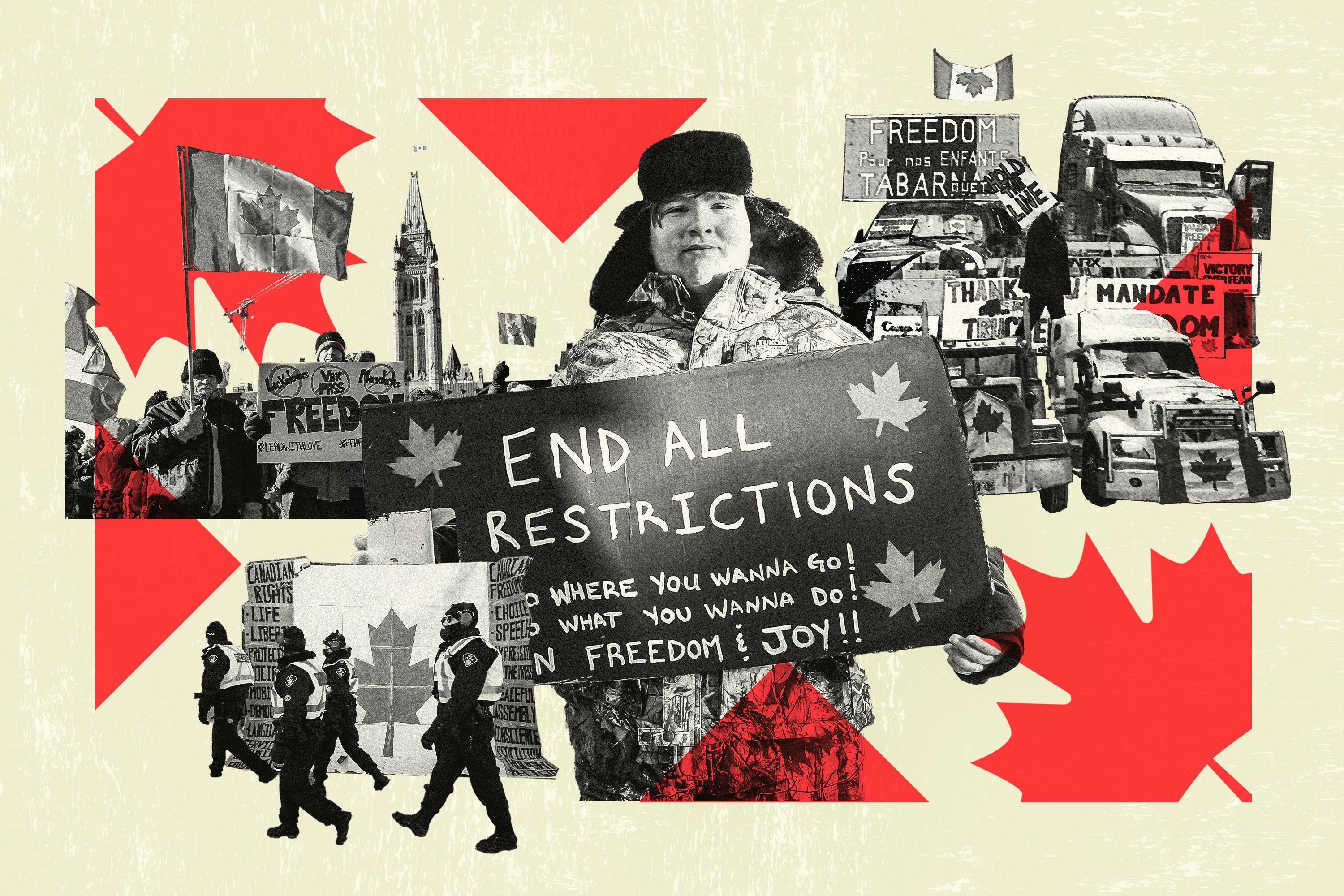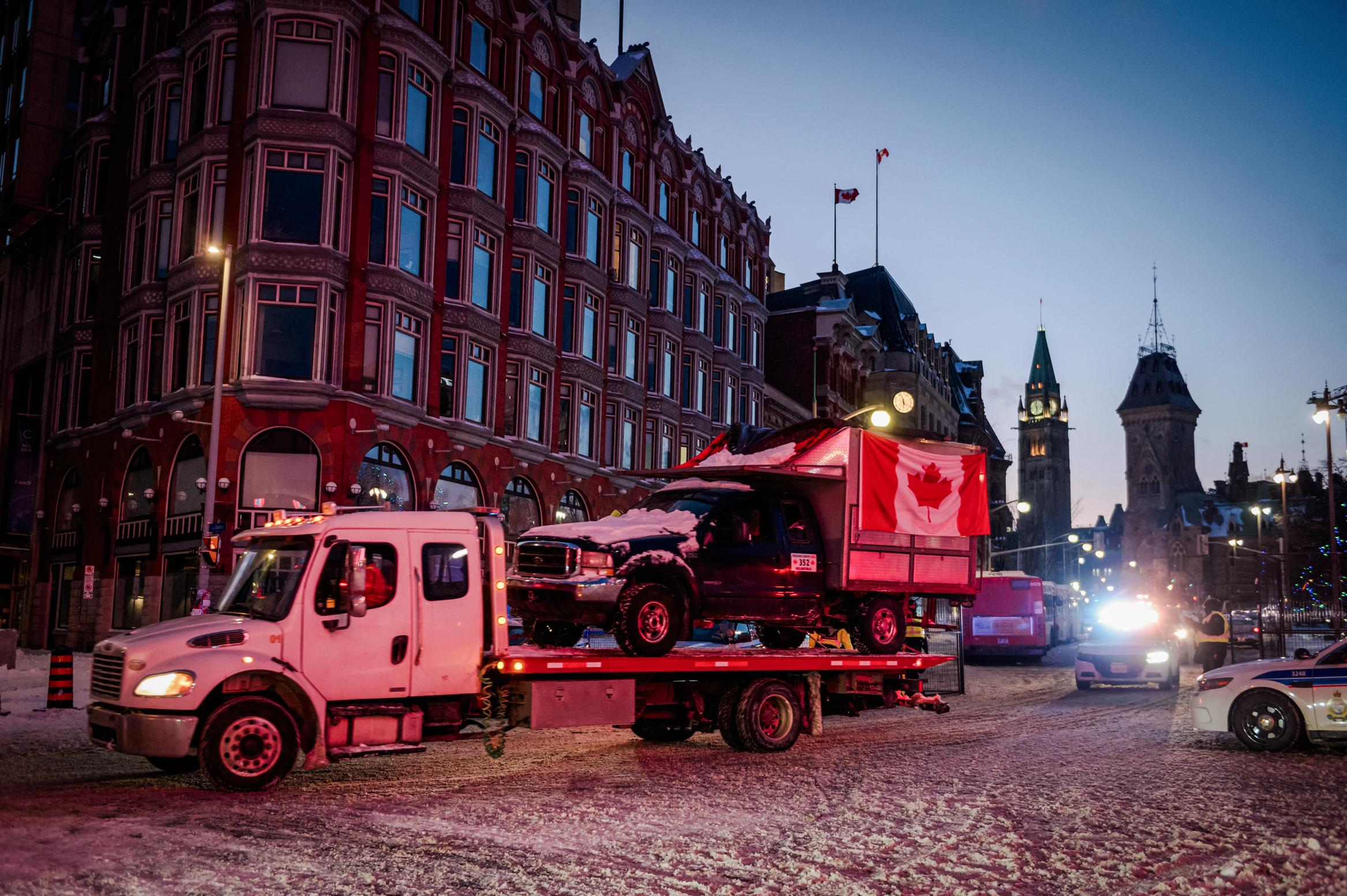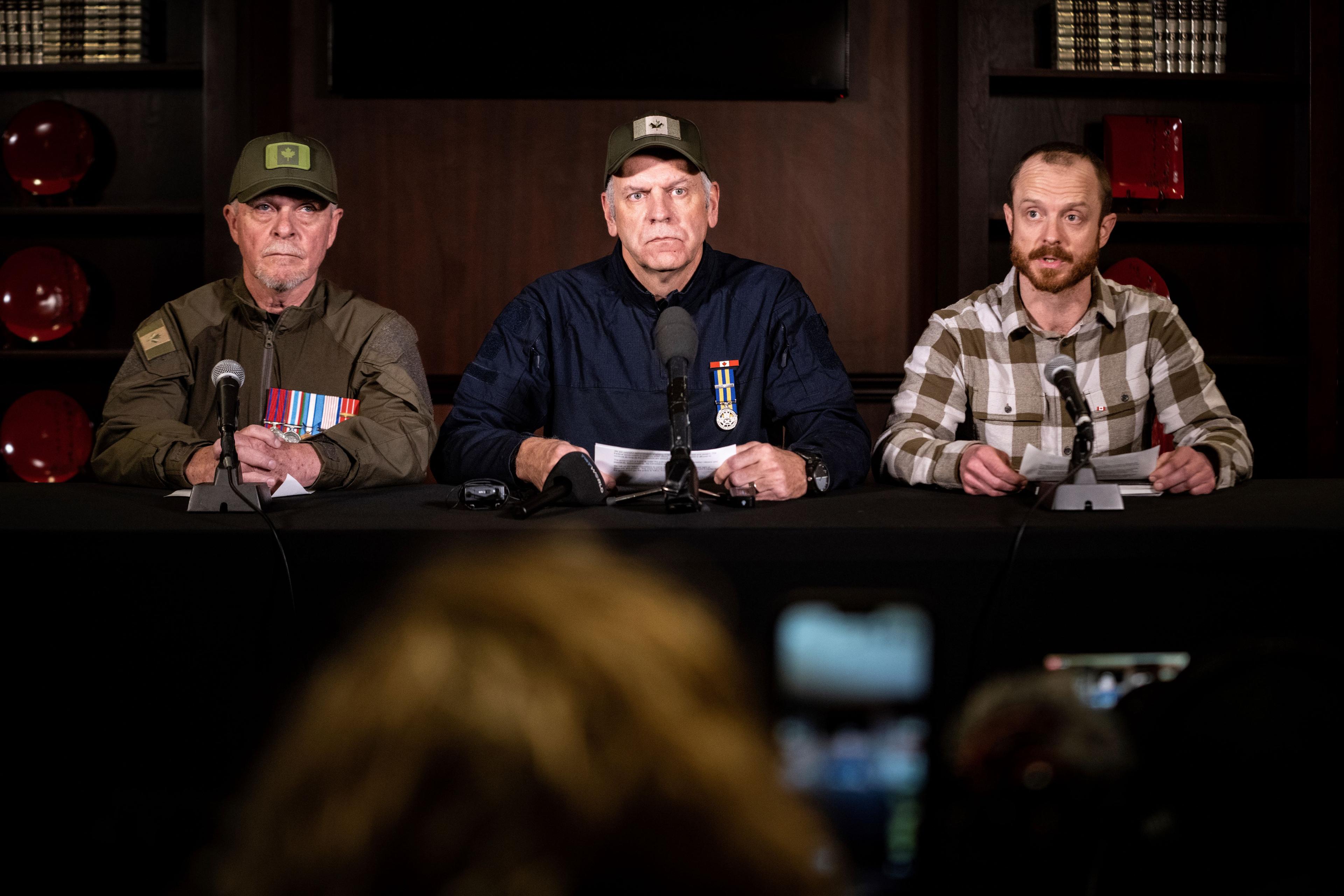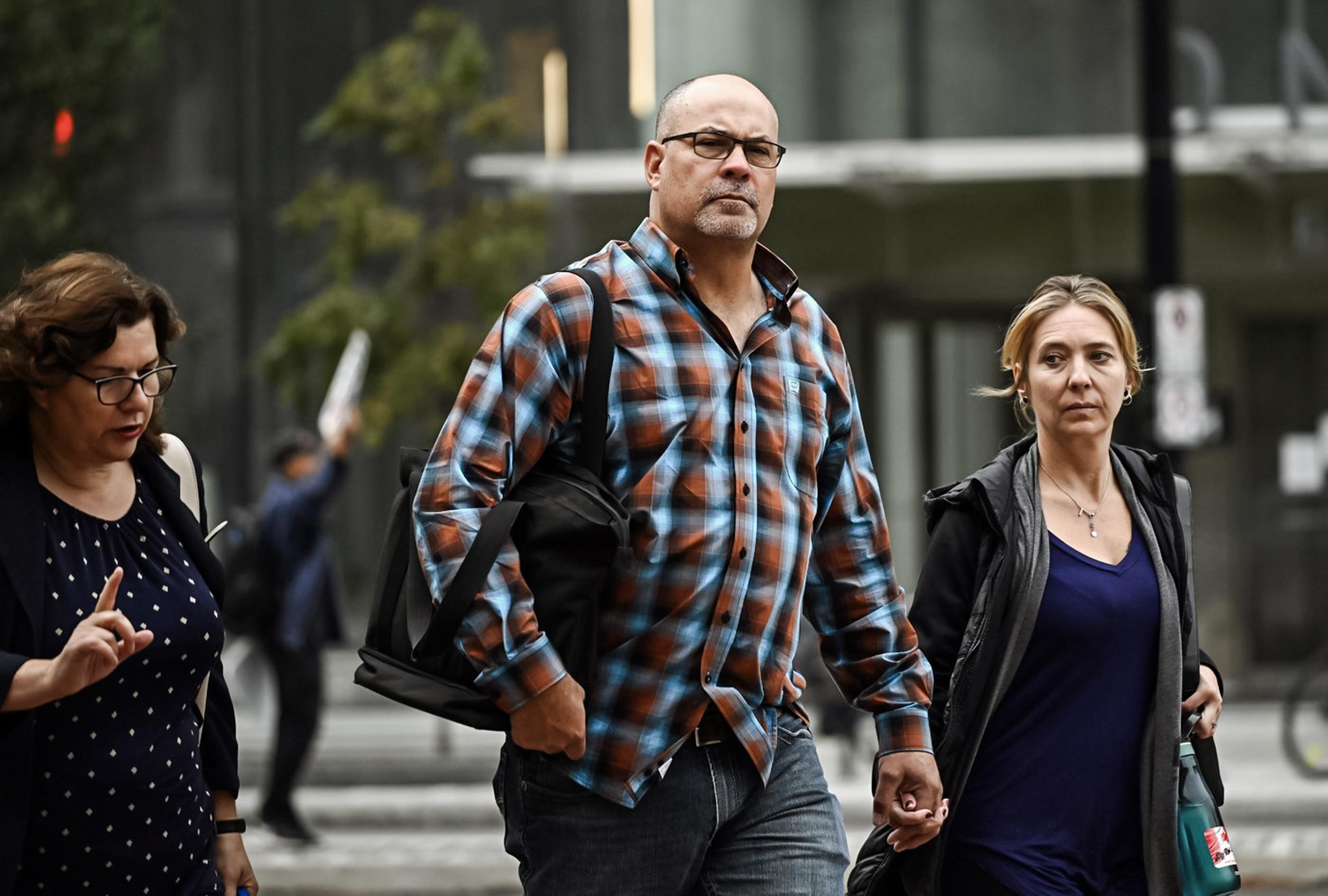- Morning Brief
- Posts
- After Court Victory for Freedom Convoy, Some Ready to Sue
After Court Victory for Freedom Convoy, Some Ready to Sue
Following a federal court ruling against the Canadian government for using the Emergencies Act during the trucker convoy, several plaintiffs plan to sue.

(Illustration by The Epoch Times, Getty Images, Shutterstock)
Several Freedom Convoy protesters, buoyed by a recent victory in Canadian federal court, said they’re preparing to sue the federal government, banks, and the police that brought the 2022 protest to a heated end.
“I think it’s the second phase to what took place with the federal court case,” military veteran and plaintiff Eddie Cornell said. “We’ve got a big hill to climb, but it’s something that’s necessary. It has to be done.”
On Jan. 23, Federal Court Justice Richard Mosley issued a ruling against the federal government’s invocation of the Emergencies Act in response to the protests and blockades that gridlocked Canada’s capital Ottawa for weeks.
The government’s use of the act did “not bear the hallmarks of reasonableness—justification, transparency and intelligibility—and was not justified in relation to the relevant factual and legal constraints that were required to be taken into consideration,” Justice Mosley wrote in his ruling.
Police veteran and plaintiff Vincent Gircys, whose bank account was frozen for more than a week under the Emergencies Act, said that while he was initially “very disappointed with our justice system—having worked in there for 32 years”—he’s pleased to see that “some level of justice is being restored.”
Alberta contractor Jeremiah Jost, who, alongside his wife, drove to Ottawa as part of the convoy, said he was “incredibly encouraged by Justice Mosley’s ruling and his courage to put his neck out.”
The ruling has likely given hope to Canadians who are upset with the country’s justice system, he said.
The Freedom Convoy, a protest response to a federal mandate requiring COVID-19 vaccination for truck drivers crossing the Canada–U.S. border, resulted in an encampment of large trucks in the nation’s capital in early 2022.
The original protest action, which began in January 2022, quickly evolved into a broader, large-scale movement in opposition to pandemic mandates and restrictions, with similar demonstrations being held at several Canada-U.S. border crossings.
The federal government invoked the Emergencies Act on Feb. 14, 2022—for the first time since its creation in 1988. The act gave law enforcement expanded powers to arrest demonstrators and to require towing companies to remove protesters’ vehicles from Ottawa’s downtown core (some of which refused).
The emergency measure also allowed the national police force—the Royal Canadian Mounted Police (RCMP)—to provide banks and other financial institutions with a list of individuals and entities involved in the protests and to ask them to freeze the accounts of those on the list.
Justice Mosley ruled that invocation of the act infringed the charter’s Section 2(b), which deals with “freedom of thought, belief, opinion, and expression,” and Section 8, which deals with the “right to be secure against unreasonable search seizure.”
The action to freeze bank accounts was “not minimally impairing,” the judge said, as the measure applied everywhere in Canada—including in areas where no protests were occurring—and because there were “less impairing alternatives available” to Ottawa.
Hours after Justice Mosley’s ruling was issued, Deputy Prime Minister Chrystia Freeland said the Liberal government intends to fight it.
“We respect very much Canada’s independent judiciary. However, we do not agree with this decision. And respectfully, we will be appealing it,” she said on Jan. 23.

A flatbed removes a truck from the convoy after police cleared Wellington Street, previously occupied by the Freedom Convoy, in Ottawa on Feb. 19, 2022. (Andrej Ivanov/AFP via Getty Images)
Lawsuits Against Government, Banks
Justice Mosley’s decision was ultimately the result of court action by five plaintiffs who participated in the protest, two of whom had their bank accounts frozen.
Three of the plaintiffs—Mr. Jost, Mr. Gircys, and Mr. Cornell—said on Jan. 29 that they plan to take further legal action against “those in government, the financial institutions who froze people’s bank accounts, and the police officers who beat up and injured innocent Canadians.”
Mr. Cornell, a co-founder of the organization Veterans 4 Freedom, said his legal team had “great success” in the federal court ruling and that he felt vindicated. His bank account was one of those that was frozen.

He said his team has established an initiative called “The Accountability Project” to fundraise for the planned lawsuit. The legal team, which is currently being assembled, will decide whether the litigation will take the form of a class-action or a tort suit.
“They want to make sure that they get it done correctly. We have complete faith in the team, because these are the guys that actually were successful with this Federal Court challenge,” Mr. Cornell said.
“I’m just hoping that Canadians will stand up and support this initiative.”
While Justice Mosley ruled that Mr. Jost lacked standing to challenge the Emergencies Act decision and ultimately dismissed his application, Mr. Jost said he was pleased to still provide video and first-hand evidence.
“I was able to be there and testify that they were filming all of us. There were snipers on the roof. They had guns, batons, rubber bullets, and pepper spray, and all those things. And they were snatching people and beating people,” he said.
“So I’m thankful I was able to be another voice for truth in the case. That was really my goal.”
‘Something Historical’
Mr. Gircys, who assisted with the logistics and coordination for the Ottawa protest, said he was in “disbelief” when city police moved in to evict the protesters from the downtown core.

Former police officer Vincent Gircys (C), Veterans 4 Freedom co-founder Eddie Cornell (L), and former RCMP officer Danny Bulford hold a news conference in Ottawa during the Freedom Convoy protest in Ottawa on Feb. 16, 2022. (Robert Bumsted/AP Photo)
“The event was peaceful, and I would never believe that our police agencies would move on peaceful protesters,” he said.
A former forensic investigator with the Ontario Provincial Police, Mr. Gircys said he had observed what was happening in regard to the vaccine mandates and travel restrictions, and as the trucker convoy converged on the nation’s capital, he felt he had to go see it for himself.
“I thought this could be something historical,” he said.
“When we arrived—and my intention was just to stay one night and head back—I could not believe how big this was, how many people were there, just how huge this event was and how incredibly happy and jovial everybody was to come together from one end of the country to the other.”
Mr. Gircys, who is based in the Toronto area and had traveled to Ottawa with his son, said he had to drive his son back to Toronto but then returned to the capital and stayed for the protest.

He said citizens came together “organically” to ensure that necessary services such as restrooms, first-aid stations, and access to fuel were provided.
“My observations with all those that I engaged with, was that this was a very peaceful event,” he said. “I’ve never seen this much unity in our country, as I had never seen such a large group of people being as happy as they were. And yet I’m constantly, every evening, observing on the news reporting that ’this was a violent, hateful group,' and nothing could be further from the truth. This was complete propaganda.”
Mr. Gircys said that after the Emergencies Act was invoked, he heard that some individuals’ bank accounts had been frozen. Then it happened to him.
He said he was able to get some money “through the goodness and kindness around me” to fuel his vehicle to get home.
“They’re violating rights on a massive scale in a number of ways, and eventually, they moved in with police en masse again,” he said.
“Having been a former police officer with 32 years of service, and having spent time in emergency management as a member of the Emergency Response Team, I’m very aware of what was about to take place from the policing side.
“I was in disbelief that this would actually be happening, because the event was peaceful,” he said.
Mr. Gircys said he’s pleased that the court found the invocation of the Emergencies Act unjustified and he’s looking forward to filing the civil suit with Mr. Jost and Mr. Cornell.
Court Ruling Has ‘Teeth’
Chris Barber, one of the Freedom Convoy’s lead organizers, said Justice Mosley’s ruling is a “step in the right direction” and will help many Canadians see how “the government trampled on us during the protests.”

Chris Barber, one of the Freedom Convoy's lead organizers, arrives for his trial at the courthouse in Ottawa, Canada, on Sept. 19, 2023. (Justin Tang/The Canadian Press)
He called the Cabinet’s intention to appeal the ruling “vindictive.”
“There’s a lot of people out there right now that are seeing just how motivated this government is toward destroying Canadian citizens and anyone who stands up against what they’re doing to us right now. So I think it’s eye-opening,” he said.
Mr. Barber and fellow organizer Tamara Lich are currently on trial in Ottawa on charges of mischief for their roles in the protest.
Mr. Barber said the recent ruling “definitely will help our case,” which began in September 2023 and is likely to stretch into the summer.
Another convoy organizer, Tom Marazzo, who is a former military member, told The Epoch Times that unlike the Public Order Emergency Commission (POEC), which found in the federal government’s favor for invoking the act, the recent federal court ruling has “teeth” and “holds the government accountable for what it did in a court of law.”
After the Emergencies Act was invoked, as required by law, the POEC was formed to evaluate if its use was justified. It was overseen by Justice Paul Rouleau, who was appointed as commissioner. The commission isn’t a court of law, but rather an inquiry whose report is presented to Parliament.
Mr. Marazzo said he wasn’t surprised that the federal government made the “political decision” to appeal Justice Mosley’s ruling.

“I don’t personally see that they have a choice. What they’re going to try to do is frame a narrative to make this decision a question mark in the minds of voters,” he said.
“Because if they accept defeat, and they don’t challenge that, it’s like accepting a ruling that somehow the Liberals have done something wrong.”
If the government’s challenge reaches the Supreme Court, Mr. Marazzo said the Liberal government could “be in trouble” if Supreme Court Chief Justice Richard Wagner is forced to recuse himself for previously criticizing the convoy, calling it “the beginning of anarchy where some people have decided to take other citizens hostage.”
In May 2022, a group of lawyers filed a complaint to the Canadian Judicial Council stating that Justice Wagner’s criticism of the convoy undermined confidence in the impartiality of the courts when it came to the Emergencies Act.
Marco Van Huigenbos, a town councilman for Fort Macleod, Alberta, who became an unofficial spokesperson for the Freedom Convoy protest in Coutts, Alberta, said that in addition to showing that Ottawa erred in invoking the Emergencies Act, the federal court ruling changes the Canadian public’s perception around the protest and challenges the “narrative the media initially spun.”
“For many people facing the courts, like myself, being that the public is the jury pool, this changes the attitude as a whole. Even if you’re completely opposed to it, you’re now thinking, ‘Maybe it wasn’t what they see, maybe the government was out of line,’” Mr. Van Huigenbos said.
“For those who knew all along that there was complete mismanagement, a lack of communication between levels of government, and a desire to squash this [protest] instead of communicate, it’s now become mainstream. That’s now the narrative.”

A demonstrator holds a sign during a protest against mandates related to COVID-19 vaccines and restrictions, in downtown Toronto, Canada, on Feb. 5, 2022. (Geoff Robins/AFP via Getty Images)
Civil Liberties Groups Support Ruling
Two civil liberties groups, the Canadian Civil Liberties Association (CCLA) and the Canadian Constitution Foundation (CCF), had argued in the court case that the Liberal government didn’t meet the legal threshold to invoke the Emergencies Act.
CCF litigation director Christine Van Geyn said she was “thrilled” with Justice Mosley’s decision.
“These were very detailed reasons and a complete vindication of the position of civil liberties organizations who viewed the invocation of the Emergencies Act as illegal, unjustified, and unconstitutional,” she said in a Jan. 23 statement.
Ms. Van Geyn said the federal Cabinet will have a “mountain to climb” to appeal the ruling, and that her organization “looks forward to the fight.”

Noa Mendelsohn Aviv, CCLA’s executive director and general counsel, said the federal court agreed with her group’s argument that the threshold for invoking the Emergencies Act is “extremely high” and that Ottawa failed to demonstrate there were threats to the security of Canada that justified its invocation.
“The Federal Court’s decision sets a clear and critical precedent for every future government,” she said in a Jan. 23 statement.
James Manson, director of legal services at the Justice Centre for Constitutional Freedoms (JCCF), told The Epoch Times that the court decision has given his organization “a measure of encouragement” and “a clear message that the charter of rights is still in existence and does still mean something.”
The JCCF has represented several Freedom Convoy protesters in court, including defending a number of protest organizers and others against a $290 million class-action lawsuit filed by Ottawa residents and businesses.
Mr. Manson said the federal court decision opens up the federal government to legal action from Canadians whose charter rights were violated as a result of their bank accounts being frozen under the Emergencies Act.
“It gives us a little bit of encouragement to keep going and to have faith that while this may be a long road, we are headed in the right direction.”